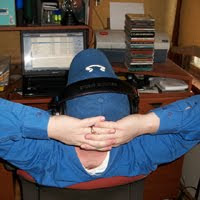02 February 2010
The Joe Versus The Volcano List; Bad Albums By Reputable Artists
Originally posted on Sundry Notes of Music, the music column for Praxis Magazine
Do you think that Tom Hanks leaves Joe Versus the Volcano off of his resume? After winning two Academy Awards in a row (only one of two people to pull that off), does it piss him off when USA Network shows that God-awful film, and bills it as "Oscar winner Tom Hanks in Joe Versus The Volcano"? Conversely, I'm sure that Meg Ryan talks it up. She'll shout it to anyone within earshot. "I was in three movies with Tom Hanks, and he never returns my calls. I used to be cute, you know!"
Every artist has that at least one embarrassing piece that makes them cringe. It's the same embarrassment you feel when your mom shows your significant other your naked baby pictures. It happens a lot in music. Sometimes an established artist will try something new that just doesn't work, or they really need the money. Sometimes they were just doing someone a favor (Michael Jackson singing back up on "Somebody's Watching Me" comes to mind). Here are a few albums by otherwise respectable artists that confused the hell out of their listening audience, and may have prompted some to demand their money back.
Hot Space – Queen (1982)
Although one of the band's most loved song is on this album, Queen's 9th album leads off this list. It's a shame that "Under Pressure" closes the CD, when it's too late for the band's David Bowie duet to save the album. Coming in at the tail end of the Disco Era, the album attempts to meld Queen's signature sound with a tired dance beat and bass line, as well as a liberal use of (the word) "funk-tion". The only positive thing about this album (besides "Under Pressure") is that the band learned its lesson and produced a more successful album, The Game, a year later.
Emotional Rescue – The Rolling Stones (1980)
On the late, lamented TV show Freaks and Geeks, a roller disco DJ (played by Joel Hodgson of Mystery Science Theater 3000 fame) trumpets "Rock and roll sucks!" and notes that even the Rolling Stones have "gone disco". Of course he was talking about Some Girls, the beginning of Stones' long downward spiral. This album made it apparent that Mick and Bianca had attended one too many cocaine-fueled orgies at Studio 54, and the credibility of a once-great rock band had been compromised. The Stones never fully recovered from their two disco albums, and their next release, Tattoo You, was a case of "too little, too late."
Kilroy Was Here – Styx (1983)
I've tried to look at this work from the perspective of Styx. Yes, the music landscape was changing. Bands like Journey, REO Speedwagon, and Styx needed to change their sound to survive the decline of classic rock. While the others found their niche, Dennis DeYoung's vision of the band's future was inspired by The Who's Tommy, and the rock opera Kilroy Was Here was born. Although the album is mostly known for its Top 40-friendly songs "Mr. Roboto" and "Don't Let it End", the concept behind Kilroy's story and lyrics is laughable. In the "story" Kilroy (DeYoung) is an aging rocker when a fascist dictatorship outlaws rock and roll. Kilroy is imprisoned by Dr. Righteous (David Young), and escapes his shackles by hollowing out a Roboto (yes, there's a story behind that stupid song). Kilroy then seeks to track down Jonathan Chance (Tommy Shaw), a young rebel who is trying to bring back rock. The heroes fight an outdated foe (Communists were the villains of choice in 1983, not fascists), armed with the most ridiculous names this side of James Cameron. The result is an unbearable cheese-fest of an album, loaded with songs like "Heavy Metal Poisoning". Unsurprisingly, nobody wanted to see the live show of Kilroy, and the disastrous concept album drove the band members apart. It would take seven years before Styx recorded another studio album.
Metal Machine Music – Lou Reed (1975)
This would be a fun party game: see how long you can listen to the first track of Metal Machine Music before you tap out and beg for it to end. If you last longer than two minutes, you win a prize. There are some who believe that this two-record "experimental" electronic noise was Reed's way of cutting loose from his contract with RCA. Reed has claimed that this album was a serious attempt at music, but he also confessed to being really high at the time. This album also marks the end of Reed's creative streak, and it gives John Cale fans all the evidence they need to prove that he was the true musical mastermind behind the Velvet Underground's best work.
Amnesiac – Radiohead (2001)
I really wanted to like this album. I gave it an honest listen. Twice. But after repeatedly subjecting myself to Amnesiac, I got the feeling that this is what severe head trauma must sound like. I guess after writing Radiohead's four previous albums, Thom York must have grown weary of composing actual songs. There is plenty of blame to be meted out for this one: by the band's third album, OK Computer, it was evident that Radiohead was en route to a major misstep in their musical catalog. Instead of staging an intervention and issuing the band an ultimatum, critics praised OK Computer as original and refreshing, ignoring the strange arrangements and weird lyrics. As a listening public, we should recognize signs like this as a musical affront, and vow to auto correct any band at the first sign that they have gone off the rails.
Subscribe to:
Post Comments (Atom)









No comments:
Post a Comment